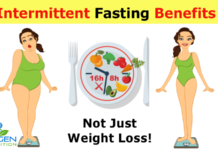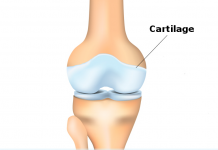Have you ever considered that those irritating stomach issues which seem to come back when you least expect them might be Irritable bowel syndrome?
Or have you had those shooting pains which can sometimes make you jump up and pace around the room in the middle of the night, but are still baffled as to what could have caused them?
It’s possible you could be suffering from IBS, there is not really any specific symptom or cause that can be applied to it, because almost every sufferer seems to have a different experience.
But hopefully this will give you a clearer view of what it’s all about.
IBS or Irritable bowel syndrome is a condition that affects the large intestine and is known to affect around ten to fifteen percent of the population around the world.
For some reason this chronic gastrointestinal disorder seems to occur fifty percent more often in women than men.
And in more than half the cases, the onset of this has occurred before thirty five years of age, and also affects between 5 % to 20% of children.
IBS is a condition belonging to a range of complaints identified as functional gastrointestinal disorders.
And although tests show that no abnormalities exist, the bowel still functions abnormally.
So What Contributes Towards IBS?
No direct causes of these problems have been established.
But researchers believe they have discovered a number of factors that may trigger the onset of the symptoms.
Some of these include emotional stress such as depression and anxiety, hormonal issues, some medications and digestive tract infections.
Recent studies carried out suggest that not one but a combination of issues acting on the intestines may be responsible for IBS. Various issues relating to the intestinal wall may activate reactions that alter bowel function.
Also, bowel irritations caused by badly digested food may stimulate the nerves in the intestinal wall. This can result in intestinal sensitivity and pain.
Some of the Symptoms of Irritable Bowel Syndrome (IBS)
As Mentioned earlier, the symptoms of irritable bowel syndrome vary from person to person.
It is believed that one in five people experience some of the unpleasant symptoms of IBS at some time.
Women are twice as likely to develop the condition as men. It rarely shows any first time symptoms in people over forty.
Some of these symptoms include diarrhea, constipation, abdominal pain, cramps, bloating, nausea, and vomiting.
Diagnosis of this condition is difficult as none of these symptoms are restricted to this syndrome alone.
Diarrhea
Diarrhea is by far the most common symptom of IBS. However it is interesting to note that in almost half of the known cases of IBS it does not cause diarrhea.
If an attack of diarrhea is imminent the need to empty the bowels can be very persistent. When taken unaware in this situation the discomfort and embarrassment can be incredibly traumatic to the sufferer.
Fear of these situations often results in people avoiding social situations.
A recent study involving 200 adults found that 12 bowel movements a week was the average for diarrhea-predominate IBS sufferers. This was more than twice the number of movements averaged by adult participants without IBS.
Constipation
More than 50% of IBS sufferers are constipation-predominate. Constipation is described as having less than three bowel movements per week. A symptom of IBS is the change in bowel movement. This change increases the speed of or slows down the regular transit of stool.
When the process slows, the bowel absorbs more water from the stool. This dries and hardens the stool, making it difficult to pass. Constipation-predominates often describes a sensation of incomplete bowel movement that encourages unnecessary straining.
Mixed or Alternating Diarrhea and Constipation
Mixed or alternating diarrhea and constipation affects approximately 20% of patients.
This condition in people with IBS involves chronic recurring abdominal pain. The chronic pain component is the best clue that the condition is indeed IBS related, and not due to diet or other factors.
This particular form of IBS is considered more severe than the others. The symptoms are more intense and they tend to occur more frequently.
The sufferers of this mixed IBS also have more varying symptoms from one person to another, which requires the treatment to be more specific to each person’s individual needs.
Pain and Cramping
Pain and cramping is also a symptom that is very common for people with irritable bowel syndrome.
Researchers believe that when IBS is present the signals sent by the gut to the brain become distorted. This results in uncoordinated digestive tract muscles becoming tense and painful.
The pain can spread over a wide area of the abdomen. However it can localize in the lower left area of the abdomen, and tends to decrease following a bowel movement.
Gas and Bloating
Increased production of gas in the gut is the result of altered digestion caused by IBS. This in turn produces the uncomfortable feeling of bloating.
Many patients claim that gas and bloating are the most persistent and irritating symptom of the condition.
Fatigue and Insomnia
Many studies have found that people with IBS often exhibit symptoms similar to insomniacs.
They have difficulty getting to sleep and wake up feeling unrested. Over half of patients polled report low stamina and fatigue that affects the quality of their life.
Anxiety and Depression
A large study of 94,000 people found that men and women with IBS were 50% more likely to have an anxiety disorder.
Over 70% were more likely to have a mood disorder such as depression than people who do not suffer from IBS.
The question of anxiety and depression is an unclear but vicious circle.
Are IBS symptoms a result of mental stress, or does the stress of being an IBS sufferer make people more likely to suffer psychological problems?
A lot of the symptoms of IBS seem to happen as a consequence of an abnormal communication between the nervous system and the bowel.

The Link Between the Gastrointestinal Tract and Your Brain
There is some belief among researchers that a faulty gut–brain connection could be one reason for IBS symptoms.
Our brains have a direct effect on our stomachs. The gastrointestinal tract (aka GI) is sensitive to all emotions.
Feelings such as anger, anxiety, sadness and even elation activate a response in the gut.
Therefore intestinal distress could be the result of feelings of anxiety, depression and even other emotions.
This is believed to be a possible cause of abnormal muscle contractions leading to IBS symptoms.
How Important is Serotonin?
It is also believed that a lack of the neurotransmitter, serotonin, may be an important trigger in the symptoms of IBS.
Research has found that a lack of serotonin in the body can alter the function of the nerve cells in the bowel. This can cause changes to sensation and bowel function.
Serotonin affects our happiness, feelings and emotions, and is an important factor in preventing anxiety and depression.
This chemical is found in the central nervous system, blood cells and the gastrointestinal tract, and is a regulator of mood, sleep and appetite.
How Do We Get the Serotonin?
To create serotonin, our body utilizes an amino acid called tryptophan, we get this from consuming high protein foods.
Tryptophan, from the protein we eat, is converted into serotonin, melatonin and vitamin B6 by the brain.
Our body cannot make its own tryptophan. Consuming food rich in protein is the only way our body has of obtaining this important amino acid.
Lots of IBS sufferers have been found to have unusually sensitive intestines and bowels.
Because of this, diet has been suggested as a possible contributor to the severity of the symptoms.
However, as no specific food or food allergy has been uncovered it is not considered to be a factor in the onset of the condition.
Is There a Solution?
The good news is, there is no determined link between irritable bowel syndrome and the more serious bowel disorders, such as colitis and bowel cancer.
But none the less the symptoms can often be very painful and disruptive.
Which can be unpleasant, embarrassing and cause some trauma to the sufferers as well.
It can also be a long term problem that has a detrimental effect on the quality of life.
If you suffer frequently with these issues, you can go and see you doctor.
But as there are currently no specific tests that can actually be performed to see if you have IBS, you will probably have to track your symptoms and give them to your physician.
Hopefully there will be no underlying serious medical condition, and all you will need is a lifestyle change including a healthy diet to eventually put things right.
































